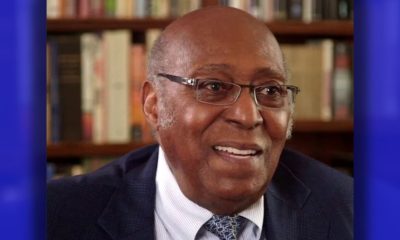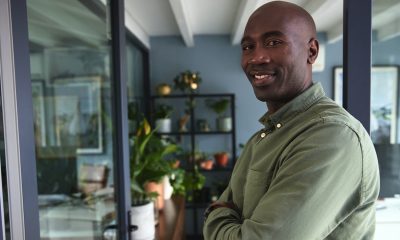National
Angela Davis Still an Activist

A current photograph of Angela Davis, professor emerita at the University of California, Santa Cruz (Courtesy photo)
At 71, the Freedom Fighter Battles On
Say the name Angela Davis and, depending upon with whom you speak, a range of opinions, emotions and thoughts automatically ensue.
But, to hear the famed political activist speak, it’s easy to understand why she has become one of the most prominently known fighters against oppression in America and around the globe.
“A lot of civil and human rights activists of the ’60s and ’70s are no longer with the movement but that’s not the case with Angela Davis. She’s still on the front lines,” said David Leonard, chair of the Washington State University’s Department of Critical Culture, Gender, and Race Studies, where Davis recently spoke to a sold-out audience.
Davis, who turned 71 on Monday, Jan. 26, holds the title of professor emerita in the Humanities Division at the University of California Santa Cruz. However, 45 years ago, she held the dubious distinction of being on the FBI’s notorious “Most Wanted” list.
It turned out the charges didn’t hold and Davis, now a noted scholar, continued her work as the face of the 1970s black power movement.
In her mid-20s when she gained the national spotlight, Davis in 1969, lost her job as an assistant philosophy professor at the University of California Los Angeles (UCLA) because the state Board of Regents cited her membership in the Communist Party.
“The dismissal sparked large-scale student protests in support of Davis’s right to teach and academic freedom. Then, roughly a year later, she became a nationally hunted fugitive after the FBI linked her to the shooting deaths of four people in a Marin County courthouse,” said Linda Weiford, a writer for the Washington State University Press.
Captured and tried, an all-white jury eventually acquitted Davis of all charges.
“I wasn’t seeking fame. I wasn’t seeking notoriety. I just wanted to be a teacher and activist,” said Davis in a recent interview with UCLA News.
Even in her personal biography, Davis focused on activism as perhaps her sole motivation in life. Over the years she has been active as a student, teacher, writer, scholar, activist and organizer. She’s also a living witness to the historical struggles of the contemporary era.
“She is someone whose name jumps out at you, whether you are black, white, Asian, or whatever,” said Kenyon Moore, a junior at Howard University in Northwest. “I think her story is worth telling and I think she’s definitely worth listening to,” Moore said.
Like many educators, Davis said she’s especially concerned with the general tendency to devote more resources and attention to the prison system than to educational institutions.
Having helped to popularize the notion of what she called a “prison industrial complex,” Davis now urges her audiences to think seriously about the future possibility of a world without prisons and to help forge a 21st century abolitionist movement.
She’s lectured in all of the fifty United States, as well as in Africa, Europe, the Caribbean, and the former Soviet Union. Davis also has written articles and essays for numerous journals and she’s authored nine books, including, “The Meaning of Freedom and other Difficult Dialogues.”
Following the shootings of Trayvon Martin in Florida, Michael Brown in Missouri and other incidents of alleged injustices against young blacks and police brutality, Davis said America had reached a time of transformation.
“There is such potential for change. All over this country from Ferguson to New York City to Washington and indeed, in other parts of the world, people are absolutely refusing to assent to racist state violence,” Davis said.
“Rather, we are saying that black bodies do matter. And our work must be to continue taking to the streets and standing together against the routine actions of police and the district attorneys who collude with them; and continue saying, ‘No Justice, No Peace, No Racist Police,’ until there is real change on the agenda for us.”
Activism
Oakland Post: Week of April 17 – 23, 2024
The printed Weekly Edition of the Oakland Post: Week of April 17 – 23, 2024

To enlarge your view of this issue, use the slider, magnifying glass icon or full page icon in the lower right corner of the browser window. ![]()
Barbara Lee
Congresswoman Barbara Lee Issues Statement on Deaths of Humanitarian Aid Volunteers in Gaza
On April 2, a day after an Israeli airstrike erroneously killed seven employees of World Central Kitchen (WCK), a humanitarian organization delivering aid in the Gaza Strip, a statement was release by Rep. Barbara Lee (D-CA-12). “This is a devastating and avoidable tragedy. My prayers go to the families and loved ones of the selfless members of the World Central Kitchen team whose lives were lost,” said Lee.

By California Black Media
On April 2, a day after an Israeli airstrike erroneously killed seven employees of World Central Kitchen (WCK), a humanitarian organization delivering aid in the Gaza Strip, a statement was release by Rep. Barbara Lee (D-CA-12).
“This is a devastating and avoidable tragedy. My prayers go to the families and loved ones of the selfless members of the World Central Kitchen team whose lives were lost,” said Lee.
The same day, it was confirmed by the organization that the humanitarian aid volunteers were killed in a strike carried out by Israel Defense Forces (IDF). Prior to the incident, members of the team had been travelling in two armored vehicles marked with the WCF logo and they had been coordinating their movements with the IDF. The group had successfully delivered 10 tons of humanitarian food in a deconflicted zone when its convoy was struck.
“This is not only an attack against WCK. This is an attack on humanitarian organizations showing up in the direst situations where food is being used as a weapon of war. This is unforgivable,” said Erin Gore, chief executive officer of World Central Kitchen.
The seven victims included a U.S. citizen as well as others from Australia, Poland, the United Kingdom, Canada, and Palestine.
Lee has been a vocal advocate for a ceasefire in Gaza and has supported actions by President Joe Biden to airdrop humanitarian aid in the area.
“Far too many civilians have lost their lives as a result of Benjamin Netanyahu’s reprehensible military offensive. The U.S. must join with our allies and demand an immediate, permanent ceasefire – it’s long overdue,” Lee said.
Commentary
Commentary: Republican Votes Are Threatening American Democracy
In many ways, it was great that the Iowa Caucuses were on the same day as Martin Luther King Jr. Day. We needed to know the blunt truth. The takeaway message after the Iowa Caucuses where Donald Trump finished more than 30 points in front of Florida Gov. De Santis and former South Carolina Governor Nikki Haley boils down to this: Our democracy is threatened, for real.

By Emil Guillermo
In many ways, it was great that the Iowa Caucuses were on the same day as Martin Luther King Jr. Day.
We needed to know the blunt truth.
The takeaway message after the Iowa Caucuses where Donald Trump finished more than 30 points in front of Florida Gov. De Santis and former South Carolina Governor Nikki Haley boils down to this: Our democracy is threatened, for real.
And to save it will require all hands on deck.
It was strange for Iowans to caucus on MLK day. It had a self-cancelling effect. The day that honored America’s civil rights and anti-discrimination hero was negated by evening.
That’s when one of the least diverse states in the nation let the world know that white Americans absolutely love Donald Trump. No ifs, ands or buts.
No man is above the law? To the majority of his supporters, it seems Trump is.
It’s an anti-democracy loyalty that has spread like a political virus.
No matter what he does, Trump’s their guy. Trump received 51% of caucus-goers votes to beat Florida Gov. Ron DeSantis, who garnered 21.2%, and former South Carolina Gov. Nikki Haley, who got 19.1%.
The Asian flash in the pan Vivek Ramaswamy finished way behind and dropped out. Perhaps to get in the VP line. Don’t count on it.
According to CNN’s entrance polls, when caucus-goers were asked if they were a part of the “MAGA movement,” nearly half — 46% — said yes. More revealing: “Do you think Biden legitimately won in 2020?”
Only 29% said “yes.”
That means an overwhelming 66% said “no,” thus showing the deep roots in Iowa of the “Big Lie,” the belief in a falsehood that Trump was a victim of election theft.
Even more revealing and posing a direct threat to our democracy was the question of whether Trump was fit for the presidency, even if convicted of a crime.
Sixty-five percent said “yes.”
Who says that about anyone of color indicted on 91 criminal felony counts?
Would a BIPOC executive found liable for business fraud in civil court be given a pass?
How about a BIPOC person found liable for sexual assault?
Iowans have debased the phrase, “no man is above the law.” It’s a mindset that would vote in an American dictatorship.
Compare Iowa with voters in Asia last weekend. Taiwan rejected threats from authoritarian Beijing and elected pro-democracy Taiwanese vice president Lai Ching-te as its new president.
Meanwhile, in our country, which supposedly knows a thing or two about democracy, the Iowa caucuses show how Americans feel about authoritarianism.
Some Americans actually like it even more than the Constitution allows.
About the Author
Emil Guillermo is a journalist and commentator. He does a mini-talk show on YouTube.com/@emilamok1.
-

 Activism4 weeks ago
Activism4 weeks agoOakland Post: Week of March 20 – 26, 2024
-

 #NNPA BlackPress3 weeks ago
#NNPA BlackPress3 weeks agoCOMMENTARY: D.C. Crime Bill Fails to Address Root Causes of Violence and Incarceration
-

 #NNPA BlackPress3 weeks ago
#NNPA BlackPress3 weeks agoMayor, City Council President React to May 31 Closing of Birmingham-Southern College
-

 #NNPA BlackPress3 weeks ago
#NNPA BlackPress3 weeks agoCOMMENTARY: Lady Day and The Lights!
-

 #NNPA BlackPress3 weeks ago
#NNPA BlackPress3 weeks agoFrom Raids to Revelations: The Dark Turn in Sean ‘Diddy’ Combs’ Saga
-

 #NNPA BlackPress3 weeks ago
#NNPA BlackPress3 weeks agoBaltimore Key Bridge Catastrophe: A City’s Heartbreak and a Nation’s Alarm
-

 Activism3 weeks ago
Activism3 weeks agoOakland Post: Week of March 27 – April 2, 2024
-

 #NNPA BlackPress3 weeks ago
#NNPA BlackPress3 weeks agoBaltimore’s Key Bridge Struck by Ship, Collapses into Water



















































